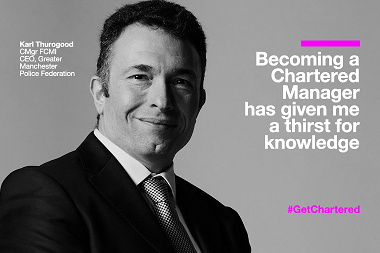Meet the Chartered Manager: the Perpetual Learner
Friday 16 December 2016
It’s never too late to stop learning. Even in his mid-forties and at the peak of his career, senior police officer Karl Thurogood took it upon himself to acquire some serious further qualifications.
Having been a manager for more than two decades, Thurogood knows the traits of a great leader. And he knows that a good manager never stops learning. In his career with the police, he has held many roles: from street policing to working as a traumatic risk manager, helping police officers deal with difficult events.
He’s also been a director at one of the UK’s largest credit unions and the largest police private healthcare scheme.
Today, Thurogood is chief executive of the Greater Manchester Police Federation, with responsibility for 6,500 police officers. As a trustee of a member-benefit trust, he also has responsibility for volunteer special constables, police community support officers and other police staff who are members of the scheme.
Chartered Manager status has helped cement that learning from his extensive career and prove that he has the skills needed to manage any situation.
“I have lots of life skills in managing, and what the Chartered Manager award brought is that stamp of approval, the hallmark to accredit the skills I have as a manager,” he says. “It enables me to stand out from the crowd.”
Thurogood uses CMI resources and research to shape the way he approaches projects and problems at work. Armed in this way, he has greater confidence when entering into negotiations with colleagues.
“When you can come with the facts, the data and the research to back up your argument, it generally sways things,” he says. “It is very influential.” Others bring opinions; Thurogood brings evidence.
He achieved Chartered Manager status with CMI after completing an MBA at the age of 46, despite leaving school with few academic qualifications. “I did an MBA because I thought it would give me a leg up,” he says. “I enjoyed that and then started looking round, asking, ‘Okay, I’ve got this MBA, which is a piece of paper, how can that lead me to management?’ The Chartered Manager award is an effective bridge between the academic and the practical application of management.”
He enjoyed the reflective nature of the Chartered Manager assessment process, which allowed him to analyse his individual approach to management: “Most managers come by [their job] naturally, and they don’t give themselves enough credit for what they do,” he says. “By making you do that self-reflection, the CMI process analyses what you do as a manager.”
This self-reflection has opened up new avenues for Thurogood, who has enrolled on another higher-education course.
“Betterment and CPD is perpetual,” he says. “There’s always a new strategy, tactic or interpretation, and you can’t stand still as a manager. The world is changing around you; technology is changing in how it is applied to people, the workplace and processes – you’ve got to stay current and on top of it.
“Managers are navigating a dangerous, winding road. They can do it, that’s not a problem, but what Chartered Managers have is the research and access to the facilities on that road to warn them of hazards, so that they can travel that route safer, faster and, hopefully, better.”
Hear Thurogood’s story in his own words here, where you can also find other inspirational stories from more of CMI’s Chartered Managers
Interview
At CMI, we’re hugely privileged to have contributed to many people’s management and leadership journeys. Take a look back at some of the people we’ve interviewed for some top tips and exclusive insight.
Members See More
CMI Members have access to thousands of online learning and CPD resources. Learn more about our membership benefits
Join The Community
CMI offers a variety of flexible membership solutions, tailored to your needs. Find out more and get involved in the CMI community today.
